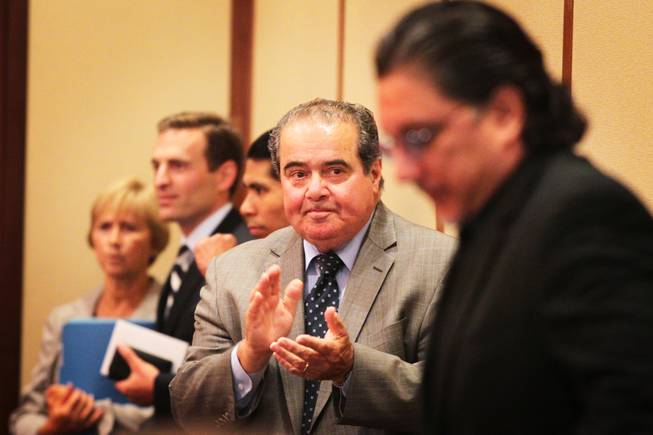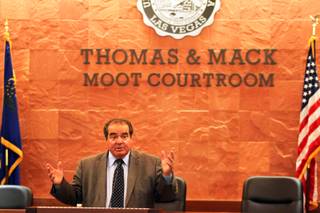
Supreme Court Justice Antonin Scalia waits to speak at the Boyd School of Law’s Thomas and Mack Moot Courtroom at UNLV in Las Vegas on Wednesday, September 5, 2012.
Published Wednesday, Sept. 5, 2012 | 12:54 p.m.
Updated Wednesday, Sept. 5, 2012 | 6:21 p.m.
When United States Supreme Court Justice Antonin Scalia opened the floor for questions Wednesday morning after a lecture at UNLV’s Boyd School of Law, law student Cathy Kama was prepared.
Clutching a scrap of paper with notes written on it, the bespectacled brunette asked the famously conservative jurist about the court’s controversial 2010 Citizens United decision, which loosened campaign finance laws.
“I just wonder if the court considered the negative impact it would have on democracy?” Kama asked Scalia. “And what I mean by negative impact is the flooding of money into the political process.”
Scalia, who has dressed down many a prominent attorney during oral arguments before the court, shot back jokingly — “No we don’t care about all that stuff” — before engaging Kama in an at-times heated back and forth, marked by Scalia’s trademark blend of sharp intellect and biting sarcasm.
“Of course the court considered that,” he said, before framing the decision as a free-speech issue. “The principle of the First Amendment is the more the merrier; the more speech the better. False speech will be answered by true speech. That’s what we believe and maybe it’s a stupid belief, but if it is you should amend the First Amendment.”
Scalia, who was appointed to the Supreme Court by Ronald Reagan in 1986, spoke to about 150 UNLV students and professors, making an impassioned argument for an originalist interpretation of the U.S. Constitution before fielding questions from the crowd.
He kept the audience laughing and engaged throughout, punctuating his arguments with expressive hand gestures, sarcastic remarks and eye rolls.
Scalia addressed a range of topics that included abortion, cruel and unusual punishment, women’s voting rights and the death penalty, each time tying the issue back to the original meaning of the Constitution as it was written in the late 1700s.
He argued against the notion of a “living Constitution” open to interpretation by judges and advocated for a strict reading of the document as written, with changes made through amendments.
“Americans used to understand … that the Constitution meant things, it meant things that didn’t change,” Scalia said. “If we wanted to change it, we had to do it the way the Constitution says, we adopted an amendment. … That’s not what we do anymore.”
Scalia pointed toward the fight for women’s suffrage during the early 20th century as an area where an amendment was added to effectively provide a right the Constitution previously neglected.
On abortion, Scalia argued the Constitution as written has no stance on the issue and that the court’s ruling in Roe v. Wade has stifled open discussion of the issue.
“It’s no use persuading your fellow citizens about abortion. It’s off the democratic stage, not a subject for democratic debate. Why? Because the Supreme Court has said so,” he said. “There is no reason for the Supreme Court to rewrite the Constitution, we have an amendment provision.”
During the question-and-answer session, Scalia addressed the recent high-profile Affordable Care Act and Citizens United decisions, while also discussing lighter-hearted topics, including memories from his first year at law school and which constitutional framer with whom he’d most like to have lunch. Afterwards, he took time to shake hands with members of the audience and sign copies of his new book “Reading Law: The Interpretation of Legal Texts.”
Kama said that although she’s deeply concerned about the negative effects of Citizens United and disagrees with some of Scalia’s stances, she’s glad she got the opportunity to hear the justice speak.
“It was fantastic. It’s an honor to have him come to UNLV,” she said.
Constitutional law professor Tom McAffee said he thought Scalia made a coherent argument for an originalist interpretation of the Constitution. But, McAffee said, Scalia’s rulings from the bench don’t line up with the arguments he made Wednesday.
“He’ll latch onto well established doctrine,” said McAffee, who took issue specifically with Scalia’s views on affirmative action. “It has nothing to do with the original meaning (of the Constitution).”


Join the Discussion:
Check this out for a full explanation of our conversion to the LiveFyre commenting system and instructions on how to sign up for an account.
Full comments policy